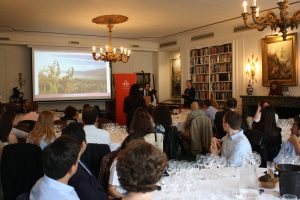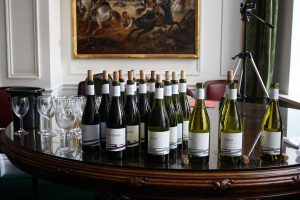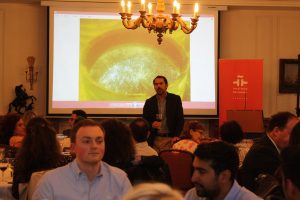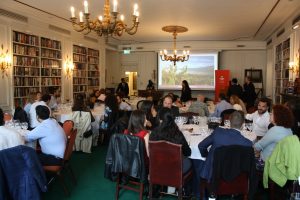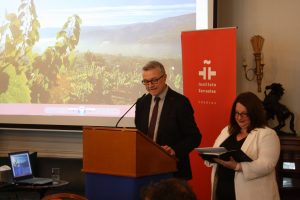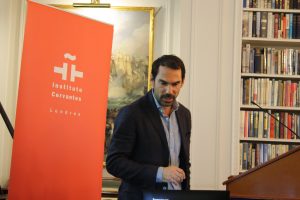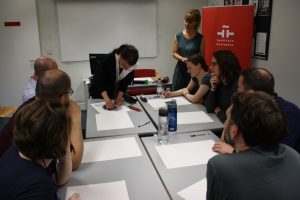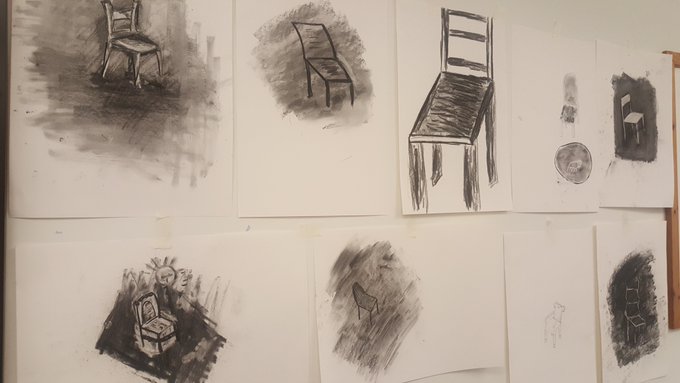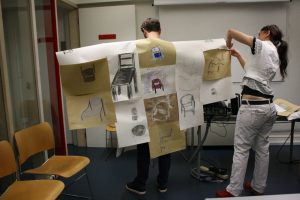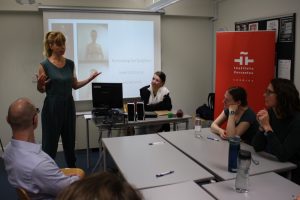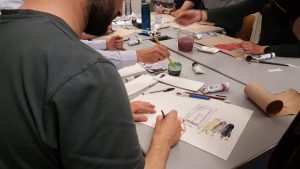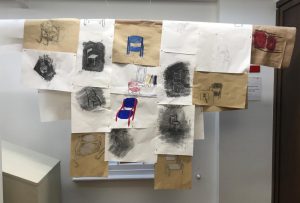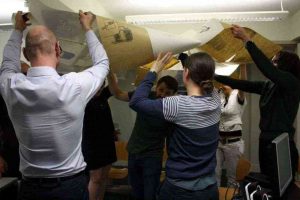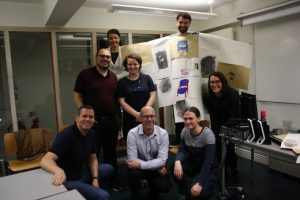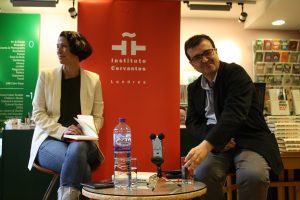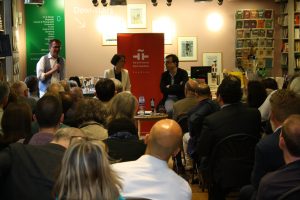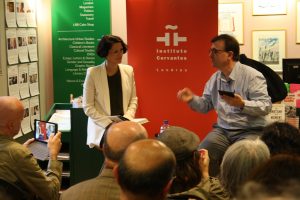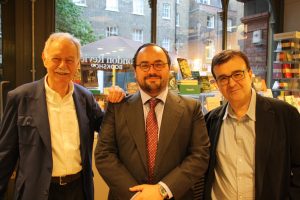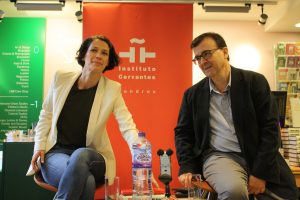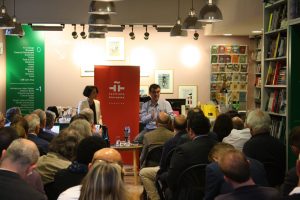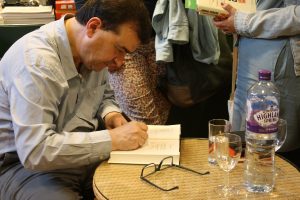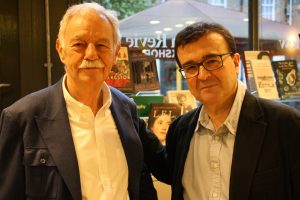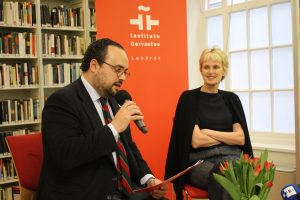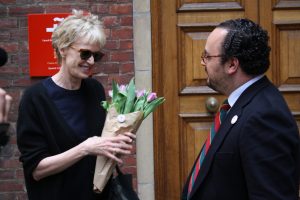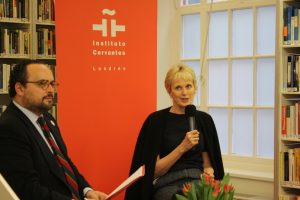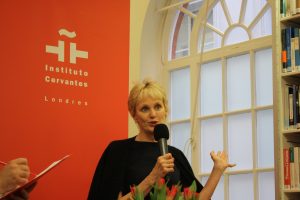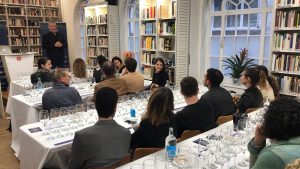The new Spanish wine, to conquer London
London hosted a wine tasting of Valdesil wineries organised by Institute Cervantes in London, by Juan Manuel Bellver, one of Spain’s best-known food and wine critics.
Bellver presented Spanish wine history through a map in which he commented the protected designation of origin throughout Spanish geography, regions of vineyards that are protected. «London in one of the European cities where wine of all kinds it is most appreciated and particularly the fortified, among which our Jerez has almost no rival», explained the general director of Lavinia Spain.
«To come here to talk about Spanish wine to such an interested audience, within the framework of a historic club like The Rag, has been an enriching and fascinating experience. The tasting allowed the attendees to enjoy in their glass the fascinating history of unknown wineries, centuries-old vines, steep slopes and dreamer vineyards that I had previously told them,” Bellver said.
Institute Cervantes in London organised the tasting in collaboration with the Spanish Wine Federation. It took place in the prestigious private club of The Rag-the Army and Navy, founded in 1837, located in St James: the heart of the capital. Originally for military and naval officers, it now welcomes everyone.
Six wines were tasted; four whites and two reds. All are currently for sale in the United Kingdom – Valdesil Sobre Lías 2018 (white wine, godello grape), Valdesil Sobre Lías 2013 (white wine, godello grape), Pezas da Portela 2016 (white wine, godello grape), O Chao 2016 (white wine, godello grape), Valderroa 2016 (red wine, mencía grape) and Valderroa Carballo 2015 (red wine, mencía grape).
This was the first of a series of lectures and wine tastings organised by the Cervantes Institute in London, which featured the first encounter with wines from the northwest of Spain, specifically from Valdeorras, in Galicia.
Borja Prada is the technical director of Valdesil and seventh generation of a family dedicated to wine. He explained how the British market was the first export for Bodegas Valdesil, starting the commercialisation of wines in 1993.
«For Valdesil the British market has been a great challenge, because it is the most demanding market in the world, but also a great satisfaction, because it confirms that the wines made by Valdesil are world class, and that they compete with the best,» says Prada.
In addition, the winemaker adds how the British market has also been «a source of joy”. This is due to the quality of the wines, which have been praised by British critics, and reviewed in publications such as: The Guardian, The Daily Telegraph, and also on the BBC, «Saturday Kitchen Live» programme.
El nuevo vino español, a la conquista de Londres
Londres acogió una cata de vinos de las bodegas Valdesil organizada por el Instituto Cervantes de Londres, a cargo de Juan Manuel Bellver, uno de los críticos gastronómicos y de vinos más conocidos de España.
Bellver presentó la historia vinícola española a través de un mapa en la quecomentó las denominaciones de origen de la geografía española. “Londres en una de las ciudades europeas donde más se aprecia el vino de todas las clases y particularmente los fortificados, entre los cuales nuestro Jerez casi no tiene rival”, explicó el director general de Lavinia España.
“Venir aquí a hablar de vino español ante un auditorio tan interesado, en el marco de un club histórico como The Rag, ha sido una experiencia enriquecedora y fascinante. La cata permitió a los asistentes disfrutar en su copa de esa historia fascinante de comarcas vinícolas ignotas, cepas centenarias, laderas escarpadas y viñadores soñadores que yo les había contado previamente”, destacó Bellver.
La cata organizada por el Instituto Cervantes de Londres en colaboración con la Federación Española del Vino, tuvo lugar en el prestigioso club privado de The Rag- the Army and Navy, fundado en 1837, originalmente para oficiales militares y navales, pero que ahora da la bienvenida a hombres y mujeres profesionales, tanto de origen militar como civil, y situado en St James, en el corazón de la capital británica.
Se cataron seis vinos, cuatro blancos y dos tintos, que están actualmente a la venta en el Reino Unido:Valdesil Sobre Lías 2018 (vino blanco, uva godello), Valdesil Sobre Lías 2013 (vino blanco, uva godello), Pezas da Portela 2016 (vino blanco, uva godello),O Chao 2016 (vino blanco, uva godello), Valderroa 2016 (vino tinto, uva mencía) y Valderroa Carballo 2015 (vino tinto, uva mencía).
Esta fue la primera de una serie de charlas y catas de vinos que organizará el Instituto Cervantes de Londres, que contó en el primer encuentro con vinos del noroeste de España, en concreto de Valdeorras, en Galicia.
Borja Prada, director técnico de Valdesil y miembro de la séptima generación familiar dedicada al vino explicó cómo el mercado británico fue el primero de exportación para Bodegas Valdesil, iniciando la comercialización de los vinos en 1993.
“Para Valdesil el mercado británico ha supuesto un gran reto, pues es el mercado más exigente del mundo, pero también una gran satisfacción, pues confirma que los vinos que elabora Valdesil son de clase mundial, y que compiten con los mejores”, comenta Prada.
Además, el enólogo reconoce como el mercado británico ha sido también “una fuente de alegría”, ya que la calidad de los vinos ha sido elogiada por los críticos británicos, y los vinos han sido reseñados en medios de comunicación como «The Guardian», «The Daily Telegraph», «Financial Times», «The Daily Mirror», y también en la BBC, en el programa «Saturday Kitchen Live”.
Teaching Spanish through art: the way of learning of the Zeta Generation
This week at the Instituto Cervantes in London, two artistic workshops on identity and gender will star in the «Making Art Happen» project. The classes will run in Spanish in order to integrate the creative process with our classroom methodology.
The project, directed by the cultural mediator Vanesa Cejudo and with the participation of the artists Isabel Castro Jung and Susana Sanromán, was born in 2017 with the aim of «taking the doctoral theses out of the boxes» and launching an exercise of pedagogical innovation.
«Making Art Happen» is an initiative supported by the Ministry of Culture, the Madrid City’s Council and Caja Navarra through the aid of Innova Culture. It aims to think about a subject (in this case, Spanish) and re-imagine it through art and its process.
«The objective is to design a methodology among the teacher, the artist and the cultural mediator for students to learn through art. This has a fundamental objective, which is to engage the Zeta generation, a generation that learns in a very different way from the traditional one, which has many sources of information, an important line of self-training and a lower level of attention than previous generations » says Cejudo.
In practice, this translates into the incorporation of more active methodologies, where the student is invited to think, to move in the classroom, to engage in dialogues, to generate dynamics with other colleagues, to contrast opinions, and finally, to materialize a work based or inspired by the guest artist.
«We want students to participate in the artistic process and to learn the subject at the same time. It is a challenge, but it is also something that we have been asked from the educational institutions to incorporate into the classroom «, explains Cejudo.
This experience, which celebrates its second edition at the Instituto Cervantes in London after the installation of Isidro López Aparicio last year, is «very exciting» in its expression, explains Cejudo.
On the one hand, this project aims to help students see contemporary art as something with which they can represent themselves. On the other, to teach them about the dynamic between the teacher and the artist: «the meeting of two worlds that go in parallel and yet coincide in similar themes».
In the workshop with Isabel Castro Jung, she will address the question of identity. Identity is a key to the work of the artist; daughter of a German mother and Galician father, and who finds «many parallels between learning to draw and learning the language».
In the case of the Galician photographer Susana Sanromán, it was very important that the students did not take the photos themselves, but that they recreated and built a set design. Both projects want to offer students the possibility of working in a different environment, where the objective is to combine verbal and rational language with the reconstruction and analysis offered by the visual world. And all through the uniting medium of the Spanish language.
Enseñar español a través del arte: la manera de aprender de la Generación Zeta
Dos talleres artísticos de identidad y género, dentro del proyecto “Making Art Happen”, protagonizaron las clases de español esta semana en el Instituto Cervantes de Londres, con el fin de integrar el proceso creativo dentro de la metodología del aula.
El proyecto, dirigido por la mediadora cultural Vanesa Cejudo y con la participación de las artistas Isabel Castro Jung y Susana Sanromán, nació en 2017 con el empeño de “sacar de los cajones las tesis doctorales” y poner en marcha un ejercicio de innovación pedagógica.
En “Making Art Happen”, iniciativa apoyada por el Ministerio de Cultura, el Ayuntamiento de Madrid y Caja Navarra a través de las ayudas de Innova Cultura, se propone pensar una asignatura, en este caso el español, mediante el arte y su proceso.
Generación Zeta
“El objetivo es diseñar entre el profesor, el artista y el mediador cultural una metodología para que los estudiantes aprendan a través del arte. Esto tiene un objetivo fundamental, que es enganchar a la generación Zeta, una generación que aprende de una manera muy diferente a la tradicional, que tiene muchísimas fuentes de información, una línea de autoformación importante y un nivel de atención menor al de generaciones previas”, comenta Cejudo.
En la práctica, esto se traduce en la incorporación de metodologías más activas, en donde el estudiante se ve invitado a pensar, a moverse en el aula, a dialogar, a generar dinámicas con otros compañeros, a contrastar opiniones, y por último, a materializar una obra basada o inspirada en el artista invitado.
“Buscamos que los alumnos participen del proceso artístico y que aprendan la asignatura a la vez. Es un reto, pero también es algo que nos han pedido desde las instituciones educativas para incorporar en el aula”, explica Cejudo.
Esta experiencia, que cumple su segunda edición en el Instituto Cervantes de Londres tras la instalación de Isidro López Aparicio el año pasado, resulta “muy emocionante” en su plasmación, explica Cejudo. Por un lado, por parte de unos estudiantes que pasan a ver el arte contemporáneo como algo que les afecta y en lo que se pueden sentir representados. Por otro, por “el encuentro de dos mundos que van en paralelo y sin embargo coinciden en temáticas afines”: el profesor y el artista.
Talleres de identidad y género
En el taller con Isabel Castro Jung se ha trabajado la cuestión de la identidad por ser clave en la obra de la artista, hija de madre alemana y padre gallego, y que encuentra “muchos paralelismos entre aprender a dibujar y el aprendizaje del idioma”.
En el caso de la fotógrafa gallega Susana Sanromán ha sido muy importante que los alumnos no hicieran ellos mismos la foto, sino que recrearan y construyeran una escenografía. Ambos proyectos quieren ofrecer a los alumnos la posibilidad de trabajar en un entorno diferente del habitual, donde el objetivo es combinar el lenguaje verbal y racional con la reconstrucción y análisis que nos ofrece el mundo visual. Y todo ello, aprendiendo español.
Javier Cercas presents his last book at Hay Festival, London and Norwich
Spanish writer Javier Cercas (Cáceres, 1962) will participate in the Hay Festival in a talk with Daniel Hahn on Saturday, June 1st and he will also be in conversation with Gaby Wood, journalist and literary director of the Booker Prize Foundation, at the London Review Bookshop on June 3rd.
Furthermore, the writer of’ ‘Soldiers of Salamis’ will also participate in the event, Stories from Europe on June 4th at the National Centre for Writing in Norwich, where he will be in conversation with writers Christina Hesselholdt, Pajtim Statovci and Lina Wolff.
In his new book, ‘Lord of all the Dead’, Cercas takes a courageous journey into his own family history and that of a country collapsing from a fratricidal war. The author revisits Ibahernando, his parents’ village in Extremadura, southern Spain, to research the life of Manuel Mena.
Javier Cercas presenta su última novela en el Hay Festival, Londres y Norwich
El escritor Javier Cercas (Cáceres, 1962) participará en el Hay Festival en un encuentro con Daniel Hahn el sábado 1 de junio y mantendrá una charla con el periodista y director literario de la Fundación Booker Prize, Gaby Wood, en la aclamada librería London Review Bookshop el 3 de junio.
Además, el autor de ‘Soldados de Salamina’ también acudirá el 4 de junio al National Centre for Writing en Norwich, donde conversará con los escritores Christina Hesselholdt, Pajtim Statovci y Lina Wolff.
En su último libro, ‘El monarca de las sombras’, Cercas hace un viaje valiente hacia su propia historia familiar y la de un país que se derrumbó a causa de una guerra fratricida. Cercas vuelve a visitar Ibahernando, el pueblo de sus padres en Extremadura, para investigar la vida de Manuel Mena.
Siri Hustvedt: El Premio Princesa de Asturias más feminista, ético y dickensiano
La escritora Siri Hustvedt, Premio Princesa de Asturias de las Letras 2019, aseguró ayer que la concesión del galardón es “una mezcla de gratitud, sorpresa y felicidad”, en una rueda de prensa celebrada en el Instituto Cervantes de Londres, ciudad en la que se encuentra promocionando su novela más reciente.
El Jurado del Premio Princesa de Asturias de las Letras 2019, reunido en Oviedo, acordó conceder el galardón a la escritora estadounidense y destacó su obra como “una de las más ambiciosas del panorama actual de las letras. Incide en algunos de los aspectos que dibujan un presente convulso y desconcertante, desde una perspectiva de raíz feminista. Y lo hace desde la ficción y el ensayo, como una intelectual preocupada por las cuestiones fundamentales de la ética contemporánea”.
Traducida a más de treinta idiomas, Hustvedt confesó que tuvo que esperar unas cuantas horas hasta que llamó a su marido, el escritor Paul Auster, residente en Estados Unidos y galardonado con el mismo premio en 2006, para asegurarse de que no le iba a despertar: “Estaba muy feliz y siento que hay algo maravilloso en que le den el premio a alguien en la misma familia. Los dos estamos muy agradecidos, yo lo estuve en su día, fue un placer verle recibir este premio y sé con seguridad que él siente lo mismo ahora”.
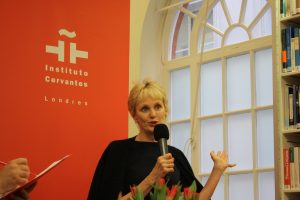
La estadounidense toma el testigo de otros escritores como Fred Vargas, Adam Zagajewski o Richard Ford y confirmó que asistirá a la ceremonia de entrega de los Premios Premio Princesa de Asturias en el Teatro Campoamor de Oviedo este otoño.
En su intervención en el centro cultural español, Hustvedt destacó el papel y la necesidad del feminismo a lo largo de los siglos, remontándose al ejemplo del texto escrito por Christine de Pizan en el siglo XIV contra la misoginia. “Las olas de feminismo reaparecen, creo que a veces lo hacen en conexión con este choque que vemos con el populismo, profundamente presente en Estados Unidos y también en España, como se ha podido comprobar en las últimas elecciones, así como en Alemania y el Este de Europa”.
Para Hustvedt, está claro que se necesita el feminismo porque la “historia no ha terminado” y también porque para ella es una forma de humanismo. Para la escritora, “las mujeres, las personas que no se identifican ni como hombres ni como mujeres, se sienten liberadas con las ideas del feminismo».
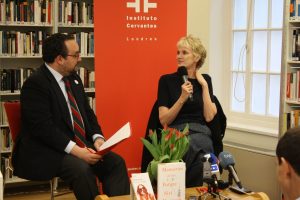
“Es un privilegio haber acogido a tan gran escritora en uno de los días más importantes de su carrera. El Premio Princesa de Asturias es uno de los mayores premios literarios del mundo y estamos encantados de tener con nosotros a una escritora clave en la escena contemporánea”, aseguró el director del Instituto Cervantes de Londres, Ignacio Peyró.
Hustvedt, que viajará en los próximos días a Manchester, a Bath, y al festival literario de Hay, recordó la figura del escritor británico Charles Dickens, sobre el que escribió su tesis doctoral en la universidad. “Mi pasión por Dickens se remonta a muchos años antes, a cuando tenía 13 años y leí David Copperfield, y fue esa novela la que me hizo leer otras. Dickens tiene un lugar muy profundo en mi vida, pero incluso se remonta a mi abuela noruega, que leía a Charles Dickens en noruego una y otra vez, él era su escritor favorito”, admitió.
Siri Hustvedt, the most feminist, ethical and Dickensian writer is awarded Princess of Asturias Award for Literature
American writer Siri Hustvedt, recipient of the Princess of Asturias Award for Literature 2019, said that the recognition was «a mixture of gratitude, surprise and happiness» at a press conference held at the Cervantes Institute in London, a city where ahe is promoting her most recent novel.
Hustvedt (Minnesota, United States, 1955) began the press conference by mentioning her father, who said that «grace is not something you deserve or that you have necessarily earned. The correct answer to grace is gratitude.»
The Jury for the Princess of Asturias Award for Literature 2019, meeting in Oviedo, Spain, said that Hustvedt’s work is one of the most ambitious on today’s literary scene. Employing a feminist perspective, she addresses a variety of facets that sketch a convulsive, disconcerting present.
Translated into more than thirty languages, Hustvedt is a scholar and intellectual who addresses the fundamental issues of contemporary ethics and epistemology. As well as being known for her feminist militancy, her work has contributed to interdisciplinary dialogue between the sciences and the humanities. She has published essays and articles in academic and scientific journals, including Contemporary Psychoanalysis, Seizure: European Neuropsychoanalysis and Clinical Neurophysiology.
The writer takes the baton from recent award winners, such as Fred Vargas, Adam Zagajewski or Richard Ford. Hustvedt confirmed that she will attend the award ceremony of the Princess of Asturias Award at the Campoamor Theater in Oviedo this autumn.
In her speech at the Instituto Cervantes in London, Hustvedt highlighted the role and need of feminism over the centuries, quoting the example of the text against misogyny written by Christine de Pizan in the 14th century. «The waves of feminism reappear, I think sometimes they do in connection with this clash we see with populism, deeply present in the United States and also in Spain, as we have been seen in the past elections, as well as in Germany and the East of Europe».
For Hustvedt, it is clear that feminism is needed because «history is not over» and also because for her it is a form of humanism. Furthermore she said «women, people who do not identify as either men or women, feel liberated with the ideas of feminism.»
«It is a privilege to have hosted such a great writer on one of the most important days of her career. The Princess of Asturias Award is one of the greatest literary awards in the world and we are delighted to have a key writer in the contemporary scene with us,”, said Ignacio Peyró, director of the Instituto Cervantes in London.
Hustvedt will travel to Manchester in the coming days, to Bath, and to Hay’s literary festival. She recalled the figure of the British writer Charles Dickens, on whom she wrote her doctoral thesis at university. «My passion for Dickens goes back many years before, when I was 13 and I read David Copperfield. It was that novel that made me read others. Dickens has a very deep place in my life, but it even goes back to my Norwegian grandmother, who read Charles Dickens in Norwegian over and over again. He was her favourite writer,” she admitted.
Londres acoge la primera edición del festival Ñ Ribera del Duero y una cata de vinos
Reino Unido es uno de los mercados de referencia a nivel mundial para el sector vitivinícola, el segundo en cuanto a importación de vino y el sexto en cuanto a consumo de vino por persona. El británico es un mercado de interés para las bodegas de la Denominación de Origen Ribera del Duero, el octavo en volumen de exportación (casi cuatrocientos mil litros en 2018), pero el primero en valor por litro (14,91 euros).
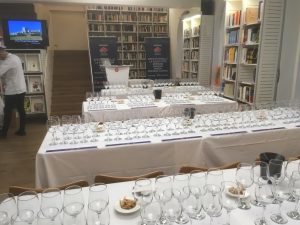
Es por ello por lo que el Consejo Regulador desarrolla desde hace años un plan promocional en ese territorio, con el objetivo de acercarse también a los jóvenes, grandes consumidores de vino de calidad y con una predisposición muy positiva hacia Ribera.
Este año la Denominación de Origen está desarrollando una intensa campaña de acciones en Reino Unido, una de las cuales es Festival Ñ Ribera del Duero, cita que tendrá lugar en Londres el próximo 18 de mayo, organizado por la DO, Sonorama Ribera y Planeta Sonoro. La programación del festival incluirá diferentes actividades con unos claros protagonistas: los vinos de Ribera del Duero y la música de artistas españoles de reconocido prestigio que triunfan a nivel internacional.

Así, el Festival Ñ Ribera del Duero Fest con las actuaciones de La Excepción Morgan y Shinova, un cartel que ha contado con el comisionado artístico de Sonorama Ribera, que desde hace dos décadas se celebra en la localidad burgalesa de Aranda de Duero. El veterano festival coproduce también la cita londinense junto con Planeta Sonoro.
Festival Ñ Ribera del Duero se presentará el día 17 de mayo en la sede del Instituto Cervantes de Londres, donde se ofrecerá a autoridades, profesionales del sector y diplomáticos una cata vip de diez vinos de otras tantas bodegas de Ribera del Duero. La cata la impartirá Pancho Campo.
El día 18 de mayo, en el propio recinto del festival, abrirá sus puertas un wine bar en el que se servirá a los asistentes al evento los vinos de otras diez bodegas, una selección de vinos de los que se podrá disfrutar en copa o por botella. Del mismo modo, se podrán comprar para disfrutarlos en casa, en lotes a la venta a precios especiales.
London holds the first edition of Ñ Ribera del Duero festival
The United Kingdom is one of the worldwide reference markets for the wine sector. Second globally in terms of importing wine and the sixth globally in terms of wine consumption per person. The British market is of interest for the wineries of the Denomination of Origin Ribera del Duero, which is the eight largest wine exporter (almost four hundred thousand litres in 2018), whilst maintaining the lead for best value per litre (14.91 euros).
For this reason, the Regulatory Council has been developing a promotional plan in the UK for the past few years. t’s main aim is to encourage and educate young professionals about high quality wine and promote Ribera del Duero.
This year the Denomination of Origin is developing an intense campaign of which this festival is one. The Ñ Ribera del Duero Festival, which will take place in London on May 18th, organized by the DO, Sonorama Ribera and Planeta Sonoro.
The festival’s program includes different activities with clear players: the Ribera del Duero wines and the music of Spanish artists of recognized prestige with international success.
The Ñ Ribera del Duero Festival includes the performances of La Excepción, Morgan and Shinova. The launch of the festival will be held on May 17th at the headquarters of the Instituto Cervantes in London, where authorities, industry professionals and diplomats will be offered a VIP tasting of ten wines from the Ribera del Duero wineries. The tasting will be given by Pancho Campo MW.
